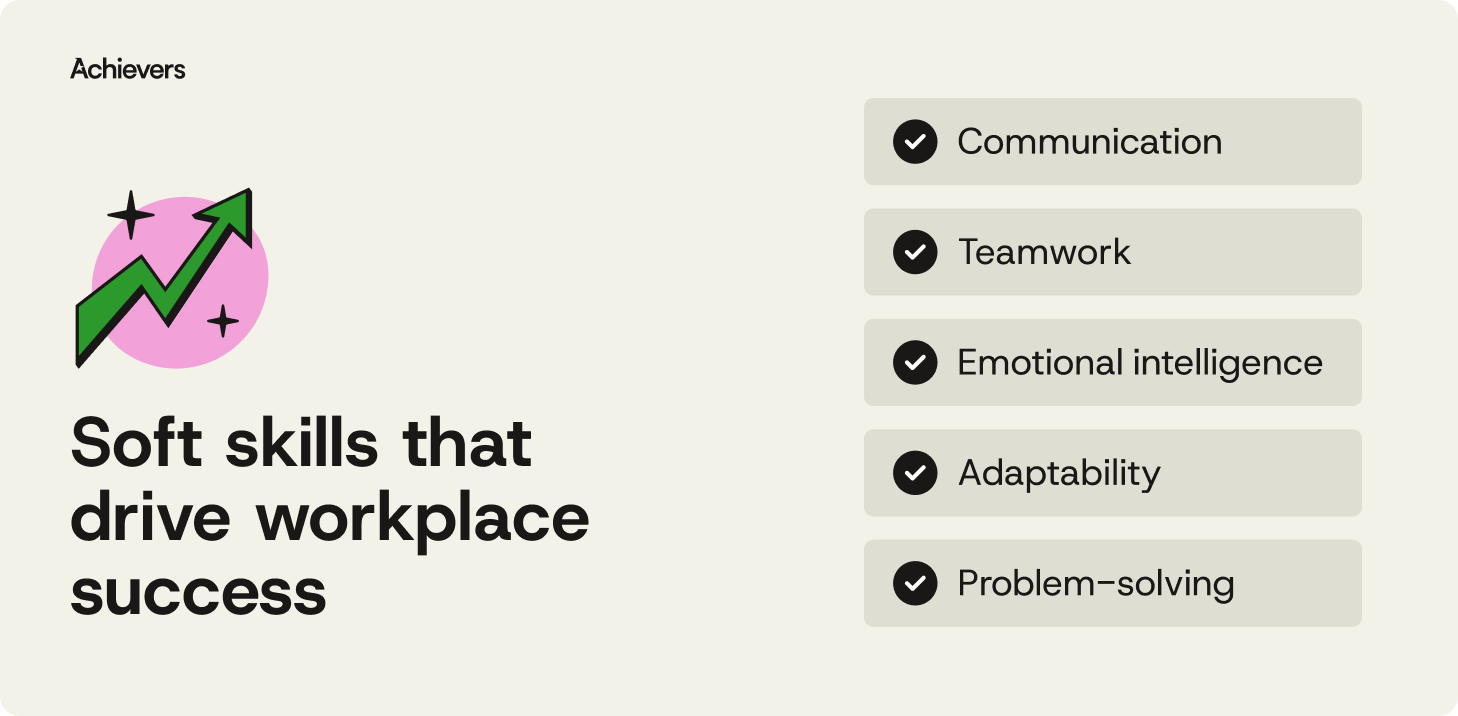Table of contents
Create a culture that means business™
Schedule a demo with an Achievers solution expert today.
Soft skills get a bad rap. They’re often labeled as “nice to have” or “hard to measure” — as if collaboration, empathy, and adaptability are some kind of bonus round in the game of workplace success. But here’s the reality: they’re the main event.
And yet, most organizations still struggle to develop them in a way that sticks. Half of HR leaders say their soft skills training is effective, but only 20% of employees agree, according to the Achievers Workforce Institute’s (AWI) New Skills Gap Report. That gap isn’t just frustrating — it’s holding teams back.
Because soft skills don’t grow in a vacuum — they need reinforcement. Recognizing them in real time helps employees understand what “good” looks like — and encourages more of it.
In this blog, we’ll explore the 10 soft skills driving the future of workplace success, how they shape culture and performance, and how recognition helps turn them into everyday habits.
10 soft skills that drive workplace success
Hard skills might get the spotlight on a résumé, but soft skills are what make work actually work. They’re how people communicate, collaborate, adapt, and lead — especially when things get messy (which, let’s be honest, they often do).
Here are 10 soft skills shaping today’s most effective teams — and why they matter more than ever.

1. Communication
Great communication isn’t just about being clear — it’s about being heard. Whether it’s navigating feedback, running a meeting, or giving project updates that don’t leave people guessing, communication sets the tone for how people work together. When done well, it builds trust, alignment, and fewer crossed wires.
2. Teamwork
Teamwork is more than being agreeable — it’s about showing up for each other. It’s the ability to collaborate under pressure, pitch in without being asked, and keep group goals front and center. In a world of cross-functional everything, it’s the glue that holds work together.
3. Emotional intelligence
Emotional intelligence shows up in quiet moments — a pause before reacting, a check-in with a stressed-out teammate, a thoughtful response to tough feedback. It helps create psychological safety and keeps teams grounded, especially when emotions run high.
4. Adaptability
Change is constant. What matters is how people respond to it. Adaptability means staying open, flexible, and ready to try something new — even when the old way felt comfortable. It’s one of the clearest signs of a growth mindset.
5. Problem-solving
Every workplace hits roadblocks. What separates great teams is their ability to stay solution-focused. Problem-solving is about approaching challenges with curiosity and calm, and getting from “this isn’t working” to “here’s what might.”
6. Critical thinking
In an age of instant reactions, critical thinking is a differentiator. It’s the ability to pause, assess the facts, and make sound decisions — even when time is short and pressure is high. It helps teams avoid missteps and move with confidence.
7. Creativity
Creativity isn’t just about blue-sky ideas. It’s about making things better. From reworking a process to improving a customer touchpoint, creativity shows up in the details. It pushes teams forward, even when the answer isn’t obvious.
8. Time management
With hybrid schedules, competing deadlines, and constant distractions, time management is what keeps everything from spiraling. It’s the underrated skill behind every on-time launch, efficient meeting, and stress-free end of day (well, almost).
9. Leadership
Leadership is more than an official job title. It’s the way you show up. It’s taking initiative, guiding others, and being accountable when it counts. The best leaders know how to motivate without micromanaging and stay steady when the pressure hits.
10. Work ethic
There’s a lot to be said for reliability — for showing up, following through, and caring about the quality of your work. Work ethic builds trust, sets the pace for teams, and makes a big difference in how things get done.
Why soft skills are your competitive advantage
Soft skills might not show up on balance sheets, but their impact is hard to miss. When employees know how to communicate, lead, adapt, and collaborate, teams move faster, work better together, and build trust that lasts — all things that competitors can’t easily replicate.
According to AWI’s New Skills Matrix Report, employees at companies with strong internal mobility programs — often built on soft skill development — are 2x more likely to feel loyal and 2x more likely to say they’re productive at work. That’s the kind of return you can’t ignore.
Here’s where soft skills create a real edge:
- Improved collaboration: Skills like communication, empathy, and problem-solving help teams align quickly, share feedback openly, and get work done with less friction.
- Better leadership pipelines: Emotional intelligence, adaptability, and accountability are the building blocks of strong, resilient leaders — not just at the top, but across the org.
- Stronger customer experiences: Employees who lead with empathy and communicate clearly are better equipped to listen, problem-solve, and build long-term customer trust.
- Increased innovation: Creative thinking and psychological safety create the conditions for experimentation, fresh ideas, and the confidence to challenge the status quo.
- Higher retention and engagement: When employees build confidence in their soft skills, they feel more empowered, more connected — and more likely to stick around. And when those skills are paired with strong internal mobility? Employees are 2x more likely to feel loyal to their organization, according to our report.
How to develop soft skills in the workplace
Soft skills aren’t personality traits — they’re learned behaviors. And like any skill, they get stronger with use, feedback, and the occasional reality check.
Despite what corporate training decks may suggest, soft skills don’t magically appear after a workshop. They’re built in the messy middle of real work — in conversations, challenges, and moments that require a bit of finesse.
Here’s how to help employees grow them, without turning it into another box to check:
- On-the-job experiences: Throwing people into new situations (gently) is one of the best ways to grow soft skills. Cross-functional projects, stretch assignments, or rotating team roles can all nudge employees to communicate more clearly, lead with empathy, or navigate conflict — sometimes all before lunch.
- Coaching and feedback: Feedback doesn’t need to be formal to be effective. Help managers share real-time, behavior-focused insights like “You kept the meeting focused and inclusive” instead of generic praise. The goal is to show what good looks like — not just that something went well.
- Peer learning and mentorship: Soft skills are often absorbed through osmosis. Peer feedback, mentoring, or even observing how others handle tough conversations can be just as powerful as any structured training.
- Leadership modeling: If leaders aren’t walking the talk, no one else will. When senior teams show vulnerability, communicate with clarity, and listen like they mean it, it gives everyone else permission to do the same.
- Real-time reinforcement: Timing matters. When someone handles a tricky situation well, don’t wait three months to bring it up in a review. Call it out when it happens. That feedback loop is what helps soft skills stick — and signals that these behaviors are valued, not just expected.
Build a culture that values soft skills
You can’t build a strong culture on soft skills alone — but you can’t build one without them, either.
The difference between companies that talk about collaboration and companies that live it? Recognition. When soft skills are frequently recognized and modeled — not just taught once and forgotten — they start to shape how teams show up, solve problems, and support each other.
Here’s how to make soft skills part of your culture’s foundation, not just its wallpaper:
- Start with the basics: Define the soft skills that matter most to your organization — think empathy, adaptability, communication — and bake them into onboarding, performance reviews, and leadership expectations.
- Make it real for managers: Managers shouldn’t just talk about soft skills — they should model them. Whether it’s how they run meetings, give feedback, or navigate difficult conversations, those daily behaviors set the tone. The result? According to AWI’s State of Recognition Report, when recognition is delivered at least monthly, manager trust and effectiveness is 3x stronger.
- Recognize the moments that matter: Soft skills often show up in the small stuff: the teammate who diffuses tension in a meeting, the project lead who keeps things moving without micromanaging, the peer who takes time to listen. When those behaviors are acknowledged in the moment, others take note.
- Scale it with structure: Recognition helps make soft skills visible and repeatable — but it has to be consistent. A platform like Achievers makes it easy to reinforce the right behaviors across teams, departments, and time zones. You can tie recognition to company values, track what’s being celebrated, and keep a pulse on culture in real time.
Recognition brings soft skills in the workplace to life
Soft skills may not come with certifications or job codes, but they’re what power performance — especially in fast-paced, people-first workplaces. They drive trust, adaptability, leadership, and collaboration. In other words, the stuff that makes businesses work better from the inside out.
But these skills don’t stick on their own. They need reinforcement — not just in the form of training slides or quarterly feedback, but through consistent, meaningful recognition in the moments that matter.
That’s where Achievers comes in. With a recognition platform designed to celebrate the behaviors that shape culture, Achievers helps organizations turn values into action — and action into results.
Because the future of work might be digital, but it still runs on human skills. Let’s make sure we’re investing in them.



